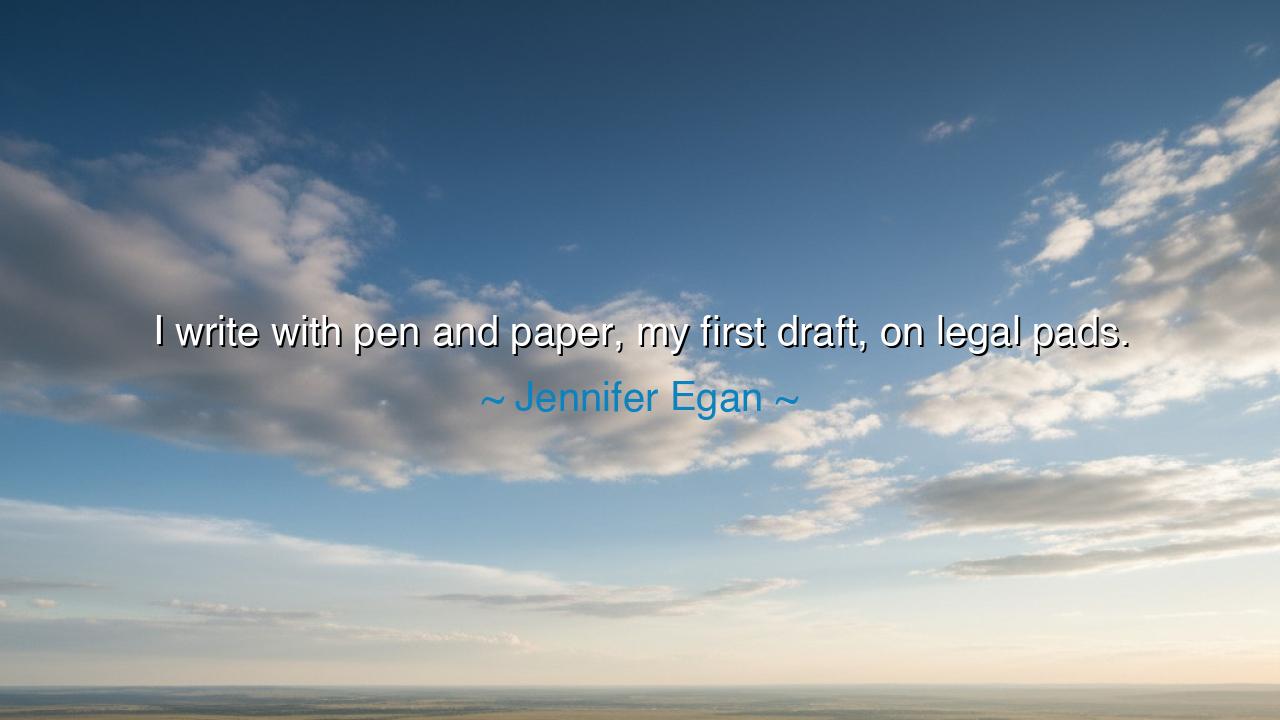
I write with pen and paper, my first draft, on legal pads.






The words of Jennifer Egan carry a quiet but profound reverence for the craft of creation: “I write with pen and paper, my first draft, on legal pads.” Though they may seem simple, these words speak to an ancient truth — that the act of writing is not merely about recording thought, but about communion between hand, mind, and soul. In an age dominated by the cold gleam of screens and the rapid hum of keys, Egan’s choice of pen and paper is not nostalgia; it is a declaration of intimacy — a return to the sacred roots of creation itself.
Before there were keyboards, there were hands stained with ink, scrolls rolled beneath trembling fingers, and tablets carved by those who sought to preserve wisdom for eternity. The ancients understood that to write was to give form to the unseen, to make the invisible visible. The slow stroke of the pen disciplines the mind, each movement demanding attention and care. In choosing the legal pad and the pen, Egan reclaims the rhythm of thought that technology too easily fragments. She invites the writer to remember that the first draft is not merely a draft of words — it is the draft of one’s spirit taking shape.
In the stillness of the page, there is an intimacy that no machine can imitate. Ink bleeds, errors remain, and the marks of hesitation and passion lie beside one another. These imperfections are the fingerprints of truth. To write by hand is to walk beside one’s thoughts, not ahead of them. The pace of the pen becomes the pace of the heart. In those moments, creation becomes meditation — a slow burning of ideas into existence. Many of history’s greatest minds, from Leo Tolstoy to Virginia Woolf, preferred this tactile communion with paper. Their masterpieces began as faint scratches on parchment before they became immortal echoes in the human mind.
The story of Leonardo da Vinci is a testament to this sacred act. He filled thousands of pages with sketches, musings, and fragmented thoughts, written backward in mirrored script. His notebooks were not tidy, but they breathed — alive with questions, theories, and dreams. He wrote not for perfection, but for discovery. That is the essence of Egan’s wisdom: the first draft is not the final word; it is the living soil in which all creation takes root. Through the pen, the mind journeys into uncharted lands, guided by the pulse of imagination rather than the precision of technology.
To those who seek the path of creativity, this teaching bears great weight. The world will tempt you toward efficiency, toward screens that erase with a click and correct without reflection. But beware, for convenience often dulls the sacred struggle from which truth is born. The pen and paper ask for more — they demand presence. When you write by hand, your thoughts cannot flee faster than your heart can follow. You must linger, reflect, and feel. And in that slowness, the voice of your deeper self begins to speak.
Egan’s quote is thus not a commentary on writing alone; it is a philosophy of living. It teaches us to return to what is tangible, to rediscover the value of patience in a world obsessed with speed. Whether you are a writer, a dreamer, or a builder of futures, remember that the first creation must always begin with touch — with something real, something imperfect. For only through imperfection can beauty emerge.
And so, let the lesson of the pen and paper be your guide: do not fear the blank page. Embrace it as your altar of creation. Write your first drafts — of words, of plans, of life itself — by hand, so that your heart may remember the weight of its own expression. Let your ink flow slowly, deliberately, like a river that knows its course. For in the humble act of handwriting lies the oldest magic — the power to turn thought into form, and form into eternity.






AAdministratorAdministrator
Welcome, honored guests. Please leave a comment, we will respond soon